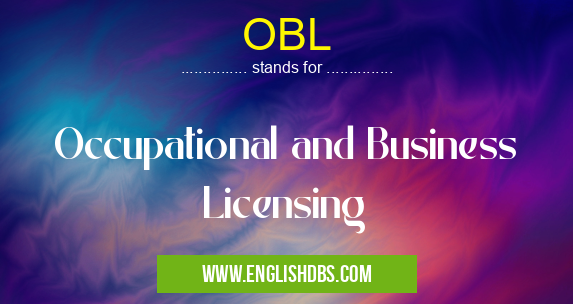What does OBL mean in BUSINESS
OBL stands for Occupational and Business Licensing. It is a regulatory framework that requires individuals and businesses to obtain licenses or permits before engaging in certain professions or operating specific types of businesses. The purpose of OBL is to protect the public from unqualified practitioners and ensure that businesses operate in a safe and compliant manner.

OBL meaning in Business in Business
OBL mostly used in an acronym Business in Category Business that means Occupational and Business Licensing
Shorthand: OBL,
Full Form: Occupational and Business Licensing
For more information of "Occupational and Business Licensing", see the section below.
Types of OBL
OBL regulations vary by jurisdiction and can include:
- Occupational Licensing: Regulates individuals practicing professions such as medicine, law, engineering, and real estate.
- Business Licensing: Regulates businesses engaged in specific industries, such as food service, retail, and construction.
Benefits of OBL
- Consumer Protection: Protects the public from unqualified practitioners and unsafe business practices.
- Quality Control: Ensures that individuals and businesses meet minimum standards of competence and safety.
- Revenue Generation: License fees can generate revenue for government agencies.
- Market Regulation: Prevents unfair competition from unqualified or unlicensed individuals and businesses.
Challenges of OBL
- Barriers to Entry: Can create barriers to entry for new businesses and individuals seeking to enter regulated professions.
- Administrative Burden: Compliance with OBL regulations can be time-consuming and costly for businesses and individuals.
- Overregulation: Excessive regulation can stifle innovation and economic growth.
Essential Questions and Answers on Occupational and Business Licensing in "BUSINESS»BUSINESS"
What is Occupational and Business Licensing (OBL)?
OBL refers to regulations and procedures that require individuals and businesses to obtain licenses or permits before engaging in certain occupations or operating specific businesses. It aims to ensure that professionals and businesses meet specific standards of competence, safety, and ethical conduct.
Why is OBL necessary?
OBL protects the public by ensuring that individuals and businesses operating in regulated industries possess the necessary qualifications, training, and insurance. It also promotes fair competition, prevents unlicensed and unqualified individuals from practicing, and maintains public trust in licensed professionals and businesses.
Who is required to obtain an OBL?
OBL requirements vary depending on the specific industry or profession. Individuals who provide services or operate businesses in regulated areas, such as healthcare, construction, real estate, and financial services, may be required to obtain an OBL.
How do I apply for an OBL?
The application process for an OBL typically involves submitting an application form, providing supporting documentation, and paying applicable fees. Applicants may need to undergo background checks, pass examinations, or meet specific experience requirements.
What are the consequences of operating without an OBL?
Operating without a required OBL can result in legal penalties, including fines, imprisonment, or both. Additionally, unlicensed individuals or businesses may not be eligible for insurance coverage or may face legal action from clients or customers.
How can I renew my OBL?
OBLs typically expire after a specific period of time, and renewal is necessary to continue operating legally. Renewal processes may involve submitting updated documentation, paying fees, and demonstrating ongoing compliance with industry standards.
Where can I find information about OBL requirements in my area?
Contact local government agencies, licensing boards, or professional organizations related to your specific industry or profession to obtain detailed information on OBL requirements and application procedures.
Final Words: OBL regulations play a crucial role in protecting the public and maintaining fair competition. However, it is important to balance the benefits of OBL with the potential challenges it poses to businesses and individuals. Effective OBL systems should be designed to minimize barriers to entry, reduce administrative burdens, and avoid overregulation while ensuring the protection of consumers and the public interest.
OBL also stands for: |
|
| All stands for obl |
